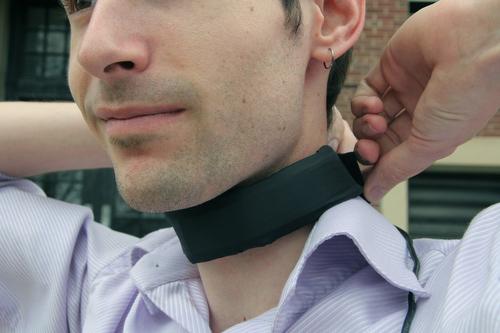Grad student recognized for invention

The Audeo is a device that picks up electrical signals traveling from the brain to the vocal chords. The device which requires no physical movement and no invasive surgery could change the way people interact with computers. Beck Diefenbach
April 3, 2007
In high school, Michael Callahan, graduate student in Engineering, had the dream of creating a memory machine that would enable people to relive memories in greater sensory detail than a camcorder or photos would ever be able to reproduce. His dream would enable children to have their memories recorded and stored for viewing later in life. To accomplish this dream Callahan has dedicated himself to the field of engineering, leading him to numerous accomplishments and accalaids.
Callahan was recognized as the Student of the Year from EE Times, a national engineering magazine, and won the Lemelson-Illinois Student Prize of $30,000, which is like the Nobel Prize for inventors. From his early beginnings at the University, when he was quoted in The Daily Illini as a senior in high school for complaining about the slow admittance process at the University, to the recent accomplishment of his first sale of “The Audeo,” Callahan said he has worked hard for everything he has achieved.
With all of his accomplishments, Callahan has not developed an inflated ego.
“He’s very humble too and he doesn’t parade around his awards,” said Andrea Karkowski, a friend of Callahan.
Callahan said he appreciates the awards and praises the message they convey to students.
Get The Daily Illini in your inbox!
“I think that students who are doing well in school should be treated on par with the athletes.” Callahan said. “I think the University is doing better on recognizing innovation.”
The invention that has been getting the attention and praise lately is a device called the Audeo, a small machine that translates brain activity to movement for a wheelchair without the person needing to physically move. Invented by Callahan and Thomas Coleman, graduate student in Engineering, this device is especially helpful for people with paralysis who are unable to move a controller on a wheelchair.
For Callahan, working hard on his job and school work comes easy because of a maxim he lives his life by. He was told in high school by one of his teachers to “find something you love to do and then find someone who will pay you to do it.”
“I couldn’t find somebody to (pay me) so I’m doing it.” Callahan said, “It’s a shame that people waste their time in jobs they don’t like.”
Callahan developed the company Ambient as part of his proposal for graduate school. Ambient develops and sells the technology he and his partners have created, along with a Web site, www.theaudeo.com, to further explain the uses of the device. As a co-founder, he is now able to control what the company does and who they help.
“The first thing we talked about for the business aspect is that he wanted to be ethical,” said Andy Smith, freshman in Engineering and assistant in Ambient. “(Callahan) makes sure we stay on track and help people who really need it.”
Ambient’s first sale went to Tim Bretl, assistant professor in aerospace engineering.
“It’s a great example of a brain machine interface,” Bretl said. “Unlike any other sensor, Mike’s sensor is very small and completely self contained. It’s about the size of a wristwatch.”
Bretl appreciates the simplicity of the software for the device and praises the hard work he can tell was put into it. He will now begin to use the device in his own research.
Callahan is only just beginning to reap the benefits of his hard work and determination. He is a firm believer in pursuing what you love doing.
“People should live purposeful lives,” said Callahan, “Not only to survive, but to look back and say, ‘Look at all of the great things I accomplished.'”






